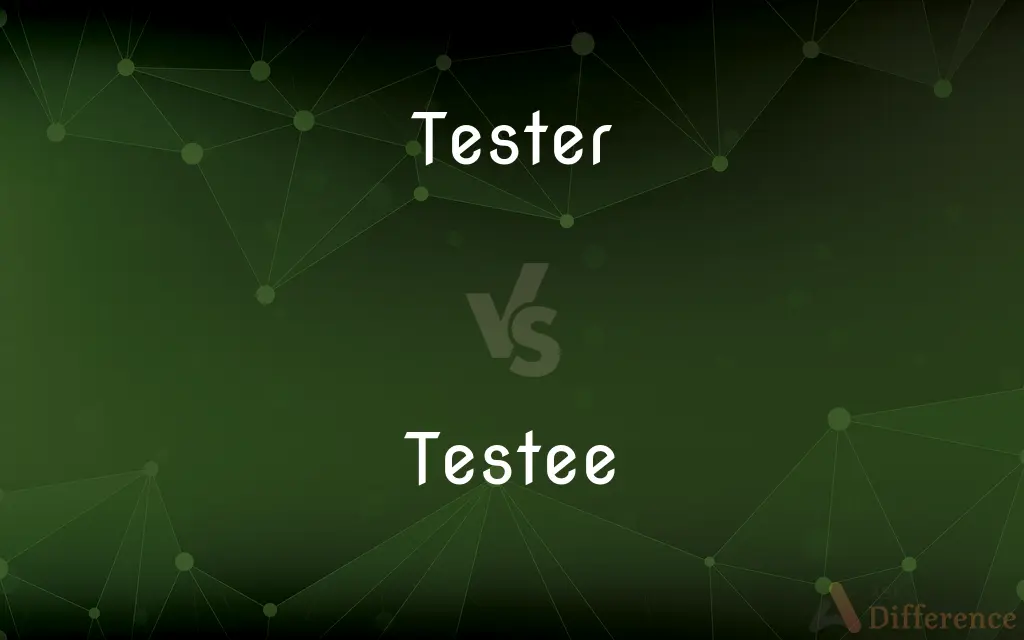Tester vs. Testee — What's the Difference?
Edited by Tayyaba Rehman — By Fiza Rafique — Updated on March 27, 2024
A tester is someone who evaluates the functionality and performance of products, while a testee is the subject or entity being tested.

Difference Between Tester and Testee
Table of Contents
ADVERTISEMENT
Key Differences
The tester is responsible for conducting evaluations to assess qualities like functionality, usability, and performance, using various tools and methodologies. On the other hand, the testee can be a person, software, system, or product that undergoes testing. The role of the tester is active, involving the application of testing procedures and assessment techniques. In contrast, the role of the testee is passive, being the subject or object that is evaluated or examined.
Testers often require a specific skill set, including analytical abilities and knowledge of testing methodologies, to effectively identify issues and ensure that the testee meets predetermined criteria. The testee, whether a person or product, is evaluated based on those criteria, which might include correctness, performance, or usability.
While testers play a crucial role in the development cycle of products, especially in technology and education, ensuring quality and compliance, testees are at the core of this process, providing the necessary feedback loop for improvement. The interaction between tester and testee is fundamental to the iterative process of quality assurance, where testers adjust and refine their approaches based on the outcomes observed in testees.
The selection of tools and techniques for testing may vary significantly depending on the nature of the testee. For software and systems, testers might use automated tools and scripts, while educational or psychological assessments require different methodologies. This differentiation underlines the adaptability required from testers and the diverse nature of testees.
Comparison Chart
Definition
The individual or group conducting the test.
The individual, product, or system being tested.
ADVERTISEMENT
Role
Active, applying testing procedures.
Passive, undergoing evaluation.
Requirements
Analytical skills, knowledge of testing methods.
Varies based on the nature of the test.
Purpose
To assess functionality, usability, performance.
To provide data or feedback for assessment.
Tools/Techniques
Depends on what is being tested (e.g., software, educational assessments).
Subject to the testing process.
Compare with Definitions
Tester
Someone who determines the importance, size, or value of something.
The tester evaluated the software's security features.
Testee
A product or system undergoing testing.
The new application was the testee in today's performance testing.
Tester
A person who investigates or scrutinizes.
The language proficiency tester assessed the candidate's speaking skills.
Testee
Someone who is considered for something, like a test or evaluation.
The testee showed great proficiency during the language test.
Tester
A person who studies or analyzes something.
The usability tester provided valuable insights into the user experience.
Testee
The individual or thing being tested or examined.
The testee completed the survey in less than an hour.
Tester
An individual who examines something carefully.
As a quality assurance tester, she ensures the app meets all requirements.
Testee
A person taking part in a test or experiment.
Each testee was given instructions before the experiment began.
Tester
Someone who assesses products or people.
The tester found several bugs in the new software release.
Testee
An example or instance for scientific examination.
The testee, a software program, exhibited unexpected behavior during the trial.
Tester
One that tests
A battery tester.
A taste tester.
Testee
One who takes or has taken a test.
Tester
A canopy, as over a bed or pulpit.
Testee
(colloquial) Someone who is tested or examined.
Tester
See teston.
Testee
Someone who is tested (as by an intelligence test or an academic examination)
Tester
A canopy over a bed.
Tester
Something that overhangs something else; especially a canopy or soundboard over a pulpit.
Tester
A person who administers a test.
Tester
A device used for testing.
Tester
A punishment of 25 lashes (strokes of a whip) across a person′s back.
Tester
A sample of perfume available in a shop for customers to try before they buy.
Tester
A miniature pot of paint for testing and comparison purposes.
Tester
(cycling) A cyclist who focuses on success in time trials.
Tester
An old French silver coin.
Tester
A sixpence.
Tester
A headpiece; a helmet.
The shields bright, testers, and trappures.
Tester
A flat canopy, as over a pulpit or tomb.
Tester
A canopy over a bed, supported by the bedposts.
No testers to the bed, and the saddles and portmanteaus heaped on me to keep off the cold.
Tester
An old French silver coin, originally of the value of about eighteen pence, subsequently reduced to ninepence, and later to sixpence, sterling. Hence, in modern English slang, a sixpence; - often contracted to tizzy. Called also teston.
Tester
Someone who administers a test to determine your qualifications
Tester
A flat canopy (especially one over a four-poster bed)
Common Curiosities
What differentiates a tester from a testee?
A tester conducts evaluations, while a testee is the subject or entity being evaluated.
How does the role of a testee contribute to the testing process?
The testee provides essential feedback or results that allow the tester to assess quality, performance, or suitability.
What skills are important for a tester?
Analytical thinking, attention to detail, and knowledge of testing methodologies are crucial for a tester.
Can a person be both a tester and a testee?
Yes, in different contexts, an individual may perform both roles, but not simultaneously in the same testing scenario.
Is the testee always a passive participant in the testing process?
While the testee's role is generally passive, in some testing scenarios, active participation (e.g., answering questions) is required.
How do testers ensure fairness in testing?
Testers use standardized procedures and controls to ensure bias is minimized and results are reliable.
Can the outcome of a test affect both the tester and the testee?
Yes, outcomes can guide further development or improvement efforts, affecting both parties.
What challenges do testers face when testing different types of testees?
Challenges include adapting testing strategies to diverse needs and ensuring accurate, meaningful results.
Can the environment affect the role of the tester or testee?
Yes, the testing environment can influence both the testing process and the outcomes.
Do testers always use the same methods for all testees?
No, testing methods vary significantly depending on the nature of the testee and the objectives of the test.
How has technology impacted the roles of testers and testees?
Technology has introduced new tools and methodologies, expanding possibilities and complexities in testing.
What are common tools a tester might use?
Tools can range from software for bug tracking and automation to standardized tests in educational settings.
How do testers decide what tests to apply to a testee?
Testers choose tests based on the objectives, the testee's characteristics, and the desired outcomes.
What ethical considerations must testers keep in mind?
Testers must ensure confidentiality, consent, and fairness, especially when testees are human participants.
What is the main goal of the interaction between a tester and a testee?
The primary goal is to gather information to evaluate the testee's qualities or performance effectively.
Share Your Discovery

Previous Comparison
Conscious vs. Consciousness
Next Comparison
Fax vs. TelefaxAuthor Spotlight
Written by
Fiza RafiqueFiza Rafique is a skilled content writer at AskDifference.com, where she meticulously refines and enhances written pieces. Drawing from her vast editorial expertise, Fiza ensures clarity, accuracy, and precision in every article. Passionate about language, she continually seeks to elevate the quality of content for readers worldwide.
Edited by
Tayyaba RehmanTayyaba Rehman is a distinguished writer, currently serving as a primary contributor to askdifference.com. As a researcher in semantics and etymology, Tayyaba's passion for the complexity of languages and their distinctions has found a perfect home on the platform. Tayyaba delves into the intricacies of language, distinguishing between commonly confused words and phrases, thereby providing clarity for readers worldwide.













































